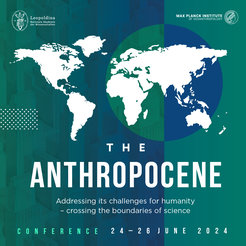Anthropocene Conference at the Max Planck Institute of Geoanthropology
The ‘Crossing Boundaries in Science – The Anthropocene’ conference will gather scholars from diverse disciplines to examine the challenges and opportunities of the Anthropocene.

Jena, Germany — The rapid and intense ways in which humanity is altering the fundamental conditions of our existence and well-being on Earth have reached a critical scale, with many experts warning of dire consequences for our future. Addressing these profound challenges requires urgent and comprehensive action across multiple disciplines.
To tackle this multifaceted issue, the Max Planck Institute of Geoanthropology (MPI-GEA) will host the ‘Crossing Boundaries in Science – The Anthropocene’ conference from 24-26 June, 2024. This event, co-organized by the German National Academy of Sciences Leopoldina, marks a significant step in MPI-GEA’s focus on Anthropocene issues. The conference will feature three days of insightful lectures and panel discussions by leading researchers from various scientific fields. Attendance is limited to registered participants.
Confirmed speakers and panelists include: Xuemei Bai, Ana Bastos, Antje Boetius, Katrin Böhning-Gaese, Jochen Büttner, Francine McCarthy, Dipesh Chakrabarty (virtual), Manfred Laubichler, Thomas Lengauer, Jochem Marotzke, Dirk Messner, Manjana Milkoreit, Onno Oncken, Henrik Österblom, Ilona Otto, Ursula Rao, Giulia Rispoli, Jürgen Renn, Johan Rockström, Hartmut Rosa, Ana Sequeira, Peter Søgaard Jørgensen, Bernd Scherer, Philipp Staab, Leonie Wenz, Mark Williams, Jan Zalasiewicz, Ricarda Winkelmann, Damaris Zurell, and Andrea Wulf. The conference will be opened by the Gerald Haug, President of the German National Academy of Sciences Leopoldina, and Patrick Cramer, President of the Max Planck Society. Thuringian State Minister of Economics, Science and Digital Society, Wolfgang Tiefensee, will open the concluding sessions of the conference.
“Human activity has become one of the, if not the strongest driver of global change today. With the multiple challenges we are facing worldwide - from the climate crisis to the biodiversity crisis, pandemics, economic shocks and conflicts - it is therefore essential that we understand the underlying dynamics and interactions of the human-Earth system in a transdisciplinary way. This is what we set out to do at the MPI of Geoanthropology,” says Ricarda Winkelmann, founding director at MPI-GEA. “I am convinced that we can only address these profound challenges together. It is therefore fantastic to see such great scholars from diverse disciplines and backgrounds come together in Jena – truly crossing boundaries in science. I hope that in this growing community, we can contribute to forging pathways towards a more sustainable future.”
Pre-conference Workshop: From 20-21 June, the Young Scientists of MPI-GEA will host a workshop titled ’Voices of the Global South on the Anthropocene’. This workshop will unite young scholars and a panel of experts from diverse backgrounds to collaboratively create an Assessment Report for the COP 30 meeting in Brazil in 2025.
Public Lecture: On 24 June, award-winning author Andrea Wulf will deliver a public lecture titled “The Invention of Nature: Alexander von Humboldt’s New World”. This lecture is open to the public and promises to be an inspiring conclusion to the conference.
By engaging the international community of scholars, the ‘Crossing Boundaries in Science – The Anthropocene’ conference aims to foster a rich exchange of ideas and generate new insights that will contribute to securing a sustainable future on Earth.
“The conference is an important opportunity to discuss the research mission of our institute with a broad international community, after the MPI-GEA was founded in 2022 as the first institute of all three sections of the Max Planck Society. Understanding the impact of humanity on the Earth system requires new scientific perspectives and collaborations beyond traditional disciplinary boundaries. That is what geoanthropology, the science of the human-Earth system, ultimately stands for,” says Jürgen Renn, MPI-GEA’s other founding director.












